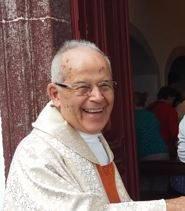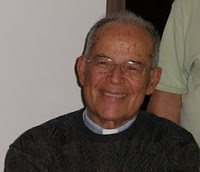by Fr. Bernardino Andrade
(bernardinodandrade@gmail.com)
My sister Matilde left home when she was fourteen years old. We were eleven brothers and sisters, and with my father and mother we were a family of 13. Living poorly in a poor neighbourhood we didn’t even know that we were poor. All the neighbours had the same life-style: no running water, no electricity, no streets. I consider my family a happy family. We had something that unfortunately has now been lost: All the neighbours helped each other. If one had no salt or sugar or a tool to do a certain job, a child would be sent to the neighbour’s house and would borrow what was necessary. Even a loaf of bread or a match, or a piece of live coal that was needed to start the necessary fire to cook.
I had two aunts working in the city, in a house of a rich family. They thought that taking my sister to the city to work with them would be helping the family. It would be one less mouth in the house to be fed. This was an event in her life that Matilde never understood. But we loved her so much and we felt as if she had been promoted to a better life. She was always very well-dressed; she would wear shoes every day, and she was very well fed. Besides this, she was extremely beautiful.
It seems that Madeira Island is small, but my sister would visit us only once a year… for Christmas. When she visited us it was a celebration in the family. We loved her very much and she loved her family. Matilde grew up and got married with a boy who lived even farther away from us. After three girls were born, all her family emigrated to Brazil where she dedicated her life to her family and to the poor, where she performed «little miracles» working with the priests of her parish and deeply involved in a national program of the Brazilian Bishops to work with very destitute children.
The first time I visited Brazil it was in 1983. Close to her house there was what they call «Favelas» or shanty towns. When I visited those shanty towns with my sister and the parish priests, I didn’t see «poverty». I only saw «misery». Pope Francis calls «misery» «poverty without hope». That’s what I saw. The last time that I visited Brazil, that «shanty town» had been transformed into a little town with beautiful little houses, with running water, with electricity, with a church and a school.
Matilde had a Bible group that used to meet every Wednesday. It was from that Bible group that this movement was born, and one day I was so proud to see Matilde leading a group of women to the city hall with big posters where three things were written to present to the authorities: «WATER» – «ELECTRICITY» -«SAFETY WITHOUT VIOLENCE».
It was Easter Sunday. I had a fax machine and she already had a fax machine too. Matilde sent me a fax wishing me Happy Easter and asked me to «forgive» her. I sent her a message back thanking her for her Easter greetings but at the end I added: «Matilde, I can love you, I can help you and support you but there is one thing that I cannot do. I cannot forgive you». Matilde got very confused with my fax, and started talking with her children «why can’t your uncle forgive me? What did I do?». Finally she wrote back to me, sounding a little sad and asked me: «What did I do that you cannot forgive?» And my answer was: «Matilde, if you want me to forgive you, you have to offend me first. And what happens is that you’ve never offended me». Forgiveness would be easier to understand if we realized that unless someone offends us, we cannot know what it is to forgive them. It doesn’t make any sense when we say that «I cannot forgive him / her because he offended me». Love is for everyone. Forgiveness is only for those who offend us.”
Love and Peace, FROM MY HEART TO YOUR HEART by Fr. Bernardino Andrade
(bernardinodandrade@gmail.com)
I COULDN’T FORGIVE MY SISTER
My sister Matilde left home when she was fourteen years old. We were eleven brothers and sisters, and with my father and mother we were a family of 13. Living poorly in a poor neighbourhood we didn’t even know that we were poor. All the neighbours had the same life-style: no running water, no electricity, no streets. I consider my family a happy family. We had something that unfortunately has now been lost: All the neighbours helped each other. If one had no salt or sugar or a tool to do a certain job, a child would be sent to the neighbour’s house and would borrow what was necessary. Even a loaf of bread or a match, or a piece of live coal that was needed to start the necessary fire to cook.
I had two aunts working in the city, in a house of a rich family. They thought that taking my sister to the city to work with them would be helping the family. It would be one less mouth in the house to be fed. This was an event in her life that Matilde never understood. But we loved her so much and we felt as if she had been promoted to a better life. She was always very well-dressed; she would wear shoes every day, and she was very well fed. Besides this, she was extremely beautiful. It seems that Madeira Island is small, but my sister would visit us only once a year… for Christmas. When she visited us it was a celebration in the family. We loved her very much and she loved her family. Matilde grew up and got married with a boy who lived even farther away from us. After three girls were born, all her family emigrated to Brazil where she dedicated her life to her family and to the poor, where she performed «little miracles» working with the priests of her parish and deeply involved in a national program of the Brazilian Bishops to work with very destitute children. The first time I visited Brazil it was in 1983. Close to her house there was what they call «Favelas» or shanty towns. When I visited those shanty towns with my sister and the parish priests, I didn’t see «poverty». I only saw «misery». Pope Francis calls «misery» «poverty without hope». That’s what I saw. The last time that I visited Brazil, that «shanty town» had been transformed into a little town with beautiful little houses, with running water, with electricity, with a church and a school. Matilde had a Bible group that used to meet every Wednesday. It was from that Bible group that this movement was born, and one day I was so proud to see Matilde leading a group of women to the city hall with big posters where three things were written to present to the authorities: «WATER» – «ELECTRICITY» -«SAFETY WITHOUT VIOLENCE».
It was Easter Sunday. I had a fax machine and she already had a fax machine too. Matilde sent me a fax wishing me Happy Easter and asked me to «forgive» her. I sent her a message back thanking her for her Easter greetings but at the end I added: «Matilde, I can love you, I can help you and support you but there is one thing that I cannot do. I cannot forgive you». Matilde got very confused with my fax, and started talking with her children «why can’t your uncle forgive me? What did I do?».
Finally she wrote back to me, sounding a little sad and asked me: «What did I do that you cannot forgive?» And my answer was: «Matilde, if you want me to forgive you, you have to offend me first. And what happens is that you’ve never offended me». Forgiveness would be easier to understand if we realized that unless someone offends us, we cannot know what it is to forgive them. It doesn’t make any sense when we say that «I cannot forgive him / her because he offended me». Love is for everyone. Forgiveness is only for those who offend us.”
Love and Peace,


